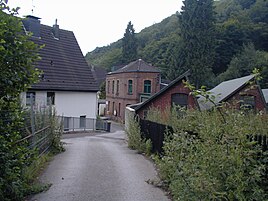Breitenbruch (Wuppertal)
|
Breitenbruch
City of Wuppertal
Coordinates: 51 ° 11 ′ 40 ″ N , 7 ° 8 ′ 58 ″ E
|
||
|---|---|---|
| Height : | 140–155 m above sea level NHN | |
|
Location of Breitenbruch in Wuppertal |
||
|
View in Breitenbruch
|
||
Breitenbruch is a town in the mountainous city of Wuppertal .
Location and description
Breitenbruch located in the south of the living quarters Cronenberg-Mitte in the district Cronenberg at an altitude of 150 m above sea level. NHN in the Morsbachtal on the city limits to Remscheid formed by the river . Neighboring towns are Bruscheid and Haster Aue ( near Remscheid).
State road 216, which here bears the name Morsbachtalstraße , runs in the valley . In Breitenbruch there is a metalworking company, the tool and knife manufacturer Fritz Ibach , in addition to several half-timbered houses belonging to the Wüsten group of houses that are listed as historical monuments . The company goes back to the Ibach family of hammer mill owners, who had owned the historic hammer mills in the village since the middle of the 19th century . In the area of hygienic paper cutting knives, the company is the world market leader with a 50% market share.
In addition to other hiking trails , the Röntgenweg , a connecting path between the Wuppertal Friends of Nature Houses , the Morsbach Adventure Trail set up as part of the Regionale 2006 and the Wuppertaler Rundweg lead through the village.
Etymology and history
The place name ending -bruch is a name for a swampy area, which is due to the damp floodplain of the Morsbach.
The place had been the location of the Breitenbruch hammers since 1598, historical hammer mills that existed there until 1955 and belonged to a man named Lutter Wüsten in the 17th century. In 1606, the first of the Schleifkotten was first mentioned in the village. In addition to these cottages , half-timbered houses and a forge were built around 1700 , which are now protected as architectural monuments . In 1993 the last of the buildings was demolished. These were owned by the heir of the Lutter Wüsten, hence the name Wüsten for the group of houses. In the late 19th and 20th centuries were under the owner's family Ibach in the hammers a jackhammer and a water turbine in operation.
The last blue scythe in the entire Bergisches Land is said to have forged and sharpened blue scythes in Breitenbruch by 1880 .
The Ronsdorf-Müngstener Railway ran through the Morsbachtal parallel to the Morsbachtalstraße and was primarily used to transport raw materials and finished goods from the companies. Breitenbruch was a stop on the railway line from 1891 to 1954 .
literature
- Günther Schmidt: Hammer and Kotten research in Remscheid. Volume 2: From Müngsten to Gerstau. Buchhandlung R. Schmitz, Remscheid-Lennep 2000, ISBN 3-9800077-2-3 .

